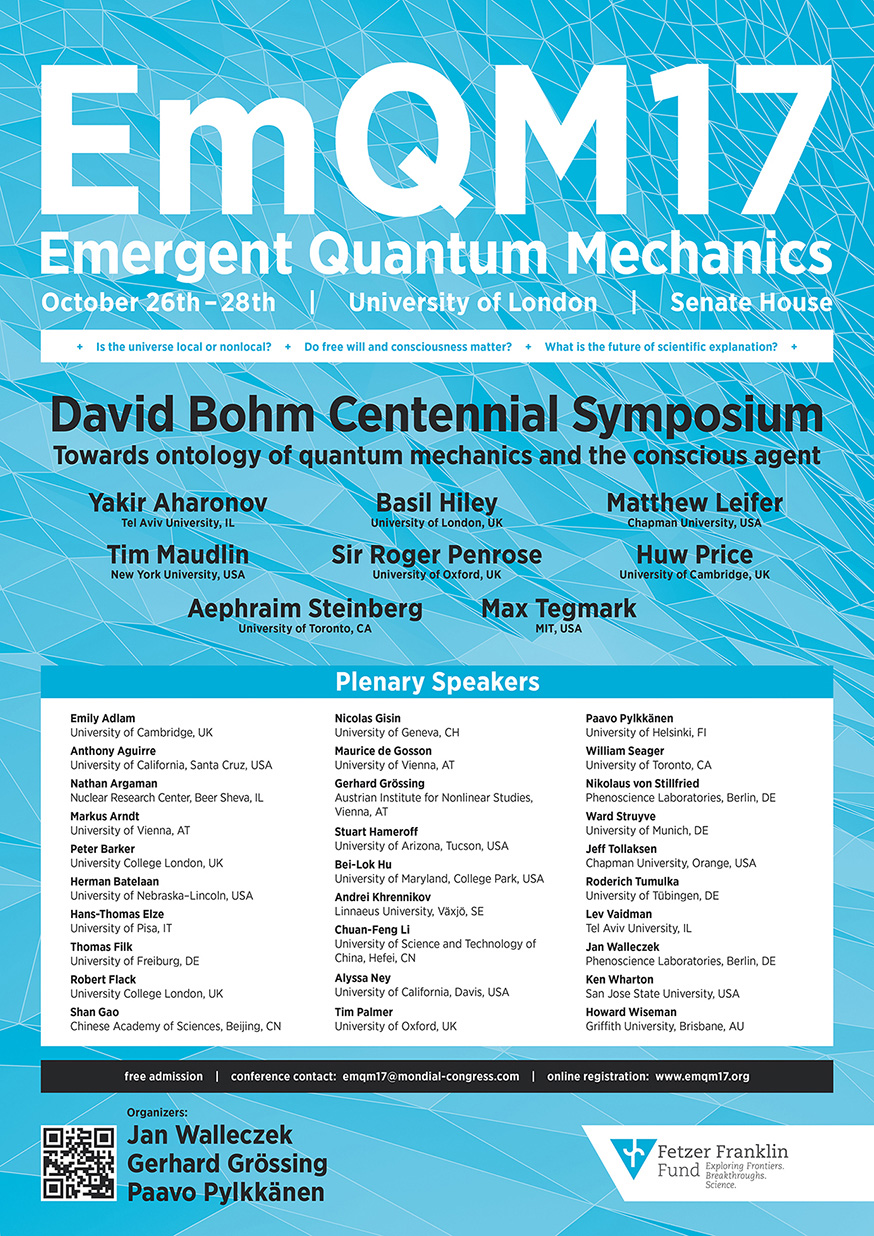Jan Walleczek1, Gerhard Grössing2, Paavo Pylkkänen3
1 Phenoscience Laboratories, Berlin, DE
2 Austrian Institute for Nonlinear Studies, Vienna, AT
3 University of Helsinki, FI, and University of Skövde, SE
Towards Ontology of Quantum Mechanics and the Conscious Agent
Presentation
Abstract
This introductory talk will provide an overview of the general topics to be covered by the Emergent Quantum Mechanics symposium (EmQM17) which explores the possibility of an ontology for quantum mechanics. Specifically, the symposium will offer an open forum for critically evaluating the prospects and significance – for 21st century physics – of ontological quantum mechanics, an approach which David Bohm helped pioneer. The resurgence of interest in realist approaches to quantum mechanics, including deterministic and indeterministic ones, challenges the standard textbook view. For example, standard “no-go” theorems against the possibility of realist, i.e., ontologically-grounded, quantum mechanics are increasingly recognized as falling short of their stated aim. Recent work also indicates that traditional assumptions and theorems such as nonlocality, contextuality, free choice, and non-signalling, need not necessarily contradict the existence of certain quantum ontologies.
In original de Broglie-Bohm theory, the mathematical formalism refers to hypothetical ontic elements (e.g., akin to John Bell’s “beables”) such as the quantum potential (Bohm, 1952). In the 21st century, realist quantum approaches often distinguish between ψ-epistemic and ψ-ontic ontological quantum theories. Unlike ψ-ontic theories, the ψ-epistemic theories do not view the wave function ψ as a state of reality. Nevertheless, both types of approaches posit—again—the possibility of an ontological foundation for quantum mechanics (Harrigan and Spekkens, 2010; Leifer, 2014).
Twenty-five years ago, David Bohm and Basil Hiley (1993) pointed out in the book “The Undivided Universe”, the close resemblance between key properties of deterministic, hidden-variable, pilot-wave theory and emergence theory, i.e., the theory describing the emergent formation of ordered (i.e., negentropic) states in nonlinear, self-organizing systems, such as deterministic chaos. The notion of ‘emergence’, when applied in the context of an EmQM, often entails two meanings: (1) theory emergence, or (2) physical emergence. Theory emergence describes the idea that the results of orthodox quantum theory might be derived from a more general, deeper-level (sub-)quantum theory. More specifically, the notion of ‘physical emergence’ in quantum systems holds that the orthodox quantum view is neither complete nor fundamental but that an as-yet unknown (sub-) quantum ontology might exist. Consequently, essential questions directing the EmQM research agenda are: Is reality intrinsically random or fundamentally interconnected? Is the universe local or nonlocal? What is the role of the conscious experimenter agent in quantum measurements? Might a radically new conception of reality include a new form of “quantum causality”?
References:
Bohm, D. (1952) A suggested interpretation of the quantum theory in terms of “hidden” variables. Phys. Rev. 85, 166-179; 180-193.
Bohm, D. and Hiley, B. J. (1993) The Undivided Universe: An Ontological Interpretation of Quantum Theory (London: Routledge) ISBN 0415065887.
Harrigan, N. and Spekkens, R.W. (2010) Einstein, incompleteness, and the epistemic view of quantum states. Found. Phys. 40, 125-157.
Leifer, M.S. (2014) Is the quantum state real? An extended review of ψ-ontology theorems. Quanta 3, 67–155.
![]()


